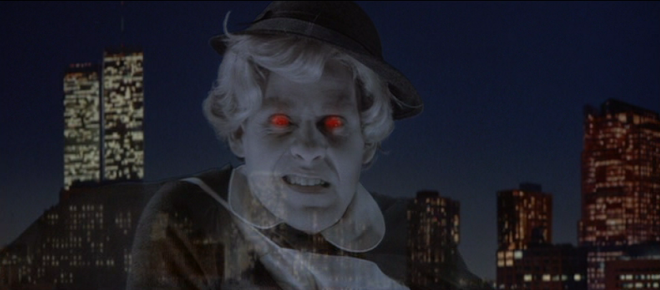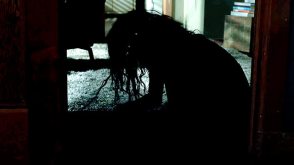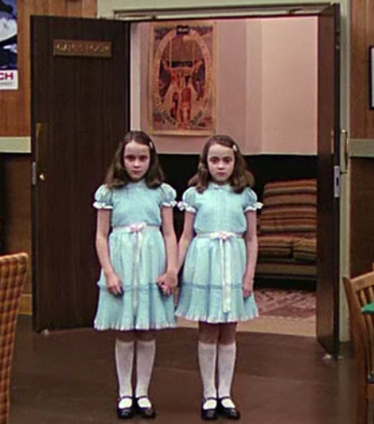 Some time ago, I started a series called “Point Counterpoint.” In the first installment, Michael and his brother debated one another about the importance of grooming in a zombie apocalypse. The series then waned, as I had difficulty contriving another debatable issue and became interested in other things. Happily, however, “Point Counterpoint” has returned! In this installment, my boyfriend, Michael, of My Comic Relief, explains why he would love to be a ghostbuster and would be ideally suited for it. I then explore the ethics of ghostbusting and why I find the practice problematic. Lend us your thoughts in the comment section!
Some time ago, I started a series called “Point Counterpoint.” In the first installment, Michael and his brother debated one another about the importance of grooming in a zombie apocalypse. The series then waned, as I had difficulty contriving another debatable issue and became interested in other things. Happily, however, “Point Counterpoint” has returned! In this installment, my boyfriend, Michael, of My Comic Relief, explains why he would love to be a ghostbuster and would be ideally suited for it. I then explore the ethics of ghostbusting and why I find the practice problematic. Lend us your thoughts in the comment section!
Michael:
If there’s one thing I know, it’s Ghostbusters. I’ve seen the movie countless times. I grew up on the cartoon. I’m in love with the comic series and have fallen in love with this summer’s magnificent Ghostbusters: Answer the Call. I’ve even worked up the courage to re-visit (the once blood-curdlingly terrifying) Ghostbusters 2. So, suffice to say, I know a thing or two about ghosts and ghostbusting. Whenever I think about the guys in grey, read one of their comics, or re-watch Ghostbusters, Ghostbusters: Answer the Call, or Ghostbusters 2 , the same thought occurs to me. I WANT TO BE A GHOSTBUSTER.
Okay, at first glance some may question the validity of this profession. I did, after all, just admit to being afraid of Ghostbusters 2. I was! I’ll own it! I also cried of fright when Kalie took me to my first horror movie (Annabelle) and still find certain horror film outings to provoke wild, terrifying nightmares in me once I’m home to my bed. Also, I’m too scared to ever ride anything but the babiest of baby rides at an amusement park. But I wouldn’t have to be scared if I was a Ghostbuster! To paraphrase Winston Zeddemore, I’d have the tools and I’d have the talent! Who’s going to be scared of Bughuul or those twins from The Shining or Krampus when you have an (admittedly unlicensed) nuclear accelerator on your back?? Nope, I think that evens the odds nicely. I’d have my PKE meter to track the ghosts (no surprises there buddy!). I’d have my proton pack to grab and hold the ghosts (nope, you’re not slipping through a wall to continue to live in my nightmares). And I’d have a trap to hold it safely in place until I got back to the office to put it in my custom designed containment unit. I can do this!

Listen, I think I’m ideally suited for this job. First, I’ve seen the first movie about a zillion times and am working on getting my tally for Ghostbusters 2 and Ghostbusters: Answer the Call up to a respectable total too. Second, I’m dating a horror enthusiast! I’ve learned all sorts of great stuff about ghosts, hauntings, and possessions since I started dating Kalie. Third, my brother and I used to pretend to be Ghostbusters all the time when we were kids. Fourth, I am a theology teacher who works in a school where the theology teachers are best friends with the science department. Um, hello? Ghostbusting is a perfect career to merge science and theology!
There you have it, my unique qualifications. I really think if you take all the experience David and I have from years of pretending to be Ghostbusters when we were little and the countless times we’ve watched the films, combine it with Kalie’s horror film knowledge/interest in the paranormal, and couple that with the interdisciplinary knowledge Matthew and Hannah (my fellow theology teachers) and Theresa, Sarah, and Ashley (the science end of our little group) would bring to the table we’d have one kick ass Ghostbusters team! I mean…we don’t know how to find, catch, or contain ghosts but that seems like a minor detail right? I’m sure we would all figure it out eventually.
Best of all, as I’ve written before, the Ghostbusters (save massive property damage) are nonviolent superheroes!!! I, being a devote pacifist, would wrestle with the implications of a job that uses violence to save the day. But the Ghostbusters don’t! Their proton streams hold the ghosts until they pull them into their traps and then deposit them in their containment unit! They aren’t destroying the ghosts or even hurting the ghosts to the best of our knowledge. It’s paranormal crowd control. And, they only contain the ghosts who are malevolent. As Ray and Peter study the PKE readings in Venice, Italy in Ghostbusters International #2, Ray tells Peter, “Most of these readings belong to benign spirits, Y’know…the quiet ones who never bother anybody.” The Ghostbusters understand and have great respect for the spiritual entities they study. They aren’t just bustin’ ghosts for the sake of bustin’ ghosts. They are only using their tools and their talent on the ones that are dangerous and a direct threat to the humans around them!

So, as Ghostbusters, we’d be saving the world without doing anything morally compromised! Nope, no punching bad guys in the face for us. It’s the perfect setup…annnnnd that’s where Kalie chimed in and blew my mind. Let’s turn things over to her for awhile now shall we? Woo hoo!!
Kalie:
While I’ve never had the burning desire to be a ghostbuster (I didn’t grow up loving the movie like Michael) I can certainly see the appeal of the aspiration for a super-fan. And though I understand the appeal of sucking up apparitions and trapping them in a little metal box, the whole process seems to me, well, unnecessarily vicious. What I’m about to say may sound a little “extreme.” And, indeed, leave it to me to use a discussion about ghostbusting to promulgate what some conservatives might call “liberal propaganda.” Read this with the understanding that, unlike many issues of equality and human rights I espouse, I have no vehemently strong feelings on this issue because I don’t much believe in ghosts, and I really don’t believe in the kind of highly disruptive spirits featured in the Ghostbuster movies. But I’m going to propose, in this brief reflection, that ghostbusting might be a method of colonization, or at the very least, a human rights violation. Or should I say unhuman rights violation. But that sounds rather judgmental. Maybe ghostbusting is a post-human rights violation, or a posthumous human rights violation. Regardless, to me, the practice seems problematic.

I have some academic arguments to propose, but let’s deal with the logistics of ghostbusting first. Have you seen the spirits in the Ghostbuster movies? These are rather large, fully functioning entities with distinct personalities. To that extent, while we don’t typically consider ghosts human, the ghost seems to possess all the qualities that make a human a human, including, presumably, a reflective, aware consciousness. As soon as we grant that the ghost has perception and awareness – even if it were only the perception and awareness of an animal – then we have to grant that ghostbusting is problematic. The ghostbuster, so-called, deals with these large, highly active, mobile beings by shooting them with laser guns and confining them to miniscule boxes. I would argue that America treats its worst criminals better than that, and these ghosts aren’t really villainous, even when they appear malicious. They’re just ghosts being ghosts, like kids will be kids.
Just because the ghost’s material body decayed long ago and she floats about in spirit form doesn’t mean it’s okay to confine her spirit to a tiny box, a box more confining than the worst prison cell. And as many-a good feminist texts, like “The Yellow Wallpaper,” will insinuate, environment is everything, and a highly restrictive environment that stifles individual agency is the most pernicious. To that end, ghostbusting causes the spirit pain and agony, and could cause a loss of hope and a diminishing of sense of self to the ghost. We can try to pride ourselves on the fact that we’re not killing the spirit, but we’re relegating it, nonetheless, to a fate worse than death, worse than the worst imprisonment. Ghostbusting causes severe emotional pain to the ghost.
I would go so far as to argue that the act of ghostbusting could be construed as an act of colonization. Just as our forefathers thought our lives and comfort more important than those of Native Americans, brutalized them and took their land, just as Great Britain has, historically, taken over “third-world” countries that it deems inherently inferior to itself based on some haphazard presumptions about what “civilization” looks like, so the ghostbuster assumes that it’s okay to “overtake” the ghost. Inherent in ghostbusting is the presumption that spirits have fewer rights than humans, even though many of the spirits in question are probably near-ancient and have been traipsing about the earth much longer than any living being currently inhabiting it. Just as colonizers take the land of the native, so we are assuming the land is inherently ours, and not the ghost’s, and assuming that not only do we have a right to legally rule the land, but that our right to the space in question is so profound, so inarguable, that we deem it completely ethical to shoot the ghost with lasers and, as I’ve explicated before, confine him or her to a miniscule box not fit for the imprisonment of a serial killer or terrorist.

This mindset is problematic with any ghost, but especially problematic if we start vaporizing peaceful ghosts. But what about the malevolent spirit, you may ask. Here, ethics are a bit unclear, but I would argue it’s still shaky policy to entrap malevolent spirits. Let’s say, for example, I buy a house. I live in this house happily for about a week or two when plates start flying around and an ominous voice moans “get out….get out!” I, the human, have just entered the house. The ghost, presumably, was the original possessor, and has lived there all along. The ghost is, then, by definition, the native. The ghost is only being malevolent because he doesn’t want to be bothered. If I entrap the ghost, I am, by definition, the colonizer.
By the laws of the living world, I’ve purchased the house – or am purchasing it slowly – and it’s rightfully mine. But as soon as we grant that there’s a world other than the living world, as soon as we have proof of a spiritual dimension, it’s incumbent upon us to co-exist peacefully with it, as if it were another group of people or a nation. I’m not saying we shouldn’t buy and sell property that may be haunted. What I am saying is that, if we shoot the native ghost with laser beams, confine him to a box, and take him away from his home territory, to a brutal sort of holding tank for ghosts, then we’re egregiously violating what I’ve come to call post-human rights, and we need to question our practice. Maybe at that point we just need to leave; maybe the property isn’t ours the way we think it is. At the very least, we should talk to the ghost.
After all, there is a branch of academic criticism called post-humanism. The branch posits that as soon as we label that which is human, we automatically feel justified in calling things inhuman and eradicating their rights for that reason. Ghostbusting is a prime example of this process. Post-humanism was made to defend those people or entities relegated to the less-than-human status.
In the end, then, while it may seem exciting, even glamorous, to be a Ghostbuster, one might argue that the only reason the process of ghostbusting has been normalized, even valorized, in our culture, is because we have a history of colonizing, oppressing, and brutalizing the so-called “other,” – the being that we deem unlike ourselves. That seems, to me, the very definition of ghostbusting. To that end, we must call this glaring violation of posthumous human rights into question.

Kalie, I’m a little disappointed that you didn’t use the term “ghostcolonialism” as a play on “postcolonialism.” What a wasted opportunity!!!
LikeLiked by 1 person
I just saw your comment. Very clever. Unfortunately the phrase never crossed my mind, but it is definitely a good one!
LikeLiked by 1 person